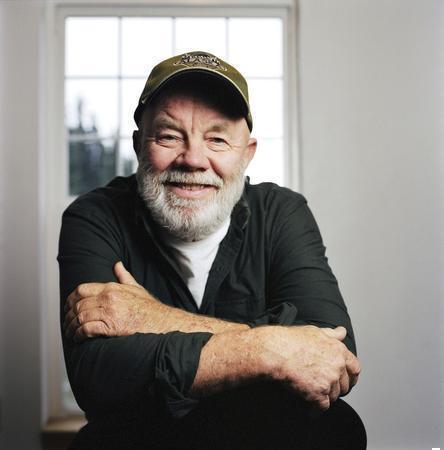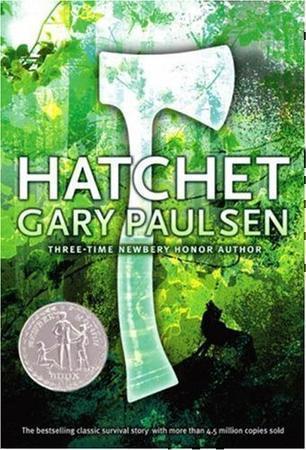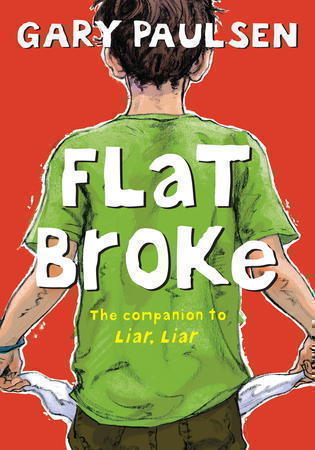
Gary Paulsen is the award-winning author of more than 200 books, including “Hatchet,” “Dog Song” and “The Winter Room.” I first spoke with Gary in 2010 in conjunction with the release of “Woods Runner.” Below is a transcript of Gary’s interview with Cracking the Cover.
Where are you now?
The Pacific Ocean. I’ve got a sailboat and I’m kicking around in the blue part for a while.
Where did the idea for “Flat Broke” come from?
It’s a continuation of the Kevin books; Kevin is 14 and tragically wrong about almost everything. He’s completely self-confident, but always misguided. I’d gotten a lot of letters after I wrote Lawn Boy, saying, “it can’t possibly be that easy to get rich as a kid” and I thought Kevin would make a good counterpoint to Lawn Boy’s incredible success. I’d written about Kevin in Liar, Liar and wasn’t quite done with him. After Flat Broke, there’s Crush, and then, I think, Vote. We’ll see. He’s a fun character and I like being in his mind and world, which are so different from my own. I am, for example, writing this in the cockpit of my boat, between throwing up from the diesel fumes as I’m trying to bleed the air bubble from my fuel line.
The last time we spoke was for “Woods Runner.” There was a lot of research involved for that novel. How is the process different for a contemporary novel like “Flat Broke”?
The research I do is never as focused and organized as I think people sometimes imagine. I’d been reading about war and American history for years before I started writing Woods Runner; it wasn’t like I came up with the book idea and then did the studying. So the actual writing of Woods Runner wasn’t that much different than writing Flat Broke, or the forthcoming Paintings from the Cave or any of the other books I’ve done and am doing. I write every day. I carry my laptop or my notebook and a pen with me and I make time every day to write wherever I am and whatever I’m doing.
I usually work on two or three books at a time and, frequently, I’ve been thinking about them for years before I ever sit down and type the first word, so I’m never quite sure how long it takes me to finish a book. It felt fast, Kevin’s stories and voice are very quick to come to me.
You seem to take on different voices easily (modern to historical to everything in between). Is it as easy as it appears?
Yes and no. Writing is … everything to me so I don’t know that I can say it’s hard, but it’s not easy, either. I get more tired when I write than when I sail on the Pacific or run dogs or ride horses in the mountains.
Do you work on more than one book at once?
Yes, always. Right now I’m working on 5 or 6 books, but I have many more ideas I’m kicking around.
What are you working on now?
A book about the animals in my life, a book I’m writing with my son, something that I’m not sure what it is but it’s been eating away at me for years, and an idea that I originally wanted to do 18 years ago when I wrote Sisters/Hermanas. I think I finally figured out how to handle the idea so we’ll see, it’s in the very early stages and I’m not sure where it’s going to lead yet.
You told me last year that you read all the time. What are you reading now?
I’m always re-reading the Patrick O’Brien books about the sea, I study them as a writer and as a sailor. And I’ve got some nonfiction about the dark ages and the golden age of sailing and exploration. And a friend gave me some essays by Stephen Jay Gould because he’s not only a scientific genius, but a great writer. Someone else suggested a police procedural mystery thriller that’s not my usual style at all but the writing and the plotting are not at all what I’d expected.
 Do you work as hard now as you did 20 years ago? Do you consider writing work?
Do you work as hard now as you did 20 years ago? Do you consider writing work?
I probably work harder. And, again, yes and no–I can’t not write, but it takes everything out of me when I work in a wonderful way. The dance with words and the way the hair on the back of my neck raises when it works right is what I live for.
What do you hope readers get out of “Flat Broke.”
All I ever hope my readers get is a good story that takes them away from wherever they are. Books saved me as a kid, gave me an escape from my horrible childhood and, if I have any hopes when I write, it’s that other readers can get as lost in the pages as I did.
Books have gone digital (kindle, nook, iBook, etc.), have you?
No, but mostly because I spend so much time in front of a computer writing. Reading ink on a page rather than a glowing screen at the end of the day is, literally, a sight for sore eyes.
What advice would you give young writers/prospective writers?
Read like a wolf eats. And write every day. No excuses. Everyone can spare five minutes a day to sit down with your writing.
Is there a book that resonates with you from your youth?
I don’t remember particular titles so much as the experience of getting lost in the book. Opening the book and turning the pages and, hours later, looking up surprised that I was in an old easy chair behind the furnace in our basement rather than on the Western plains or on the ocean or in the woods or wherever the book had taken me.

